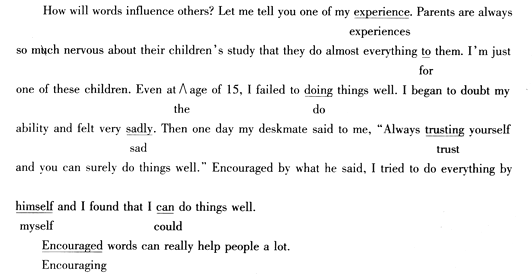题目内容
【题目】假定英语课上老师要求同桌之间交换修改作文,请你修改你同桌写的以下作文。文中共有10处语言错误,每句中最多有两处。每处错误仅涉及一个单词的增加、删除或修改。
增加:在缺词处加一个漏字符号(∧),并在其下面写出该加的词。
删除:把多余的词用斜线(\)划掉。
修改:在错的词下划一横线,并在该词下面写出修改后的词。
注意:1.每处错误及其修改均仅限一词;
2.只允许修改10处,多者(从第11处起)不计分。
How will words influence others? Let me tell you one of my experience.Parents are always so much nervous about their children’s study that they do almost everything to them.I’m just one of these children.Even at age of 15,I failed to doing things well.I began to doubt my ability and felt very sadly.Then one day my deskmate said to me,“Always trusting yourself and you can surely do things well.”Encouraged by what he said,I tried to do everything by himself and I found that I can do things well.
Encouraged words can really help people a lot.
【答案】
【解析】
本文为记叙文。文章叙述了“语言是如何影响他人”的个人经历。
第一处:考查名词。experience表“经验”,是不可数名词;表“经历”,是可数名词。根据one of my…“我的……之一”可知,此处应意为“我的经历之一”,应使用复数形式。故experience改为experiences。
第二处:考查句式。此处为固定句式so+adj./adv.+that…“如此……以至于”,much与so重复,应删除。故删除much。
第三处:考查介词。固定短语:do sth. for sb.“为某人做某事”。故to改为for。
第四处:考查冠词。固定短语:at the age of+基数词“在多少岁的时候”。故age前添加the。
第五处:考查动词搭配。固定搭配:fail to do sth.“没能做成某事”。故doing改为do。
第六处:考查形容词。feel“感到”,属于感官系动词,其后需要加形容词。故sadly改为sad。
第七处:考查祈使句。此处为“祈使句,and+句子”句型。故trusting改为trust。
第八处:考查代词。句意:我试图自己做所有的事情,我发现我能把事情做好。根据句意可知,此处指代“我自己”。故himself改为myself。
第九处:考查时态。此处为宾语从句,根据I found可知,应使用一般过去式。故can改为could。
第十处:考查形容词。encouraged“受鼓舞的”,encouraging“令人鼓舞的”。此处意为“鼓励的话真地可以帮助人们很多”。故Encouraged改为Encouraging。


